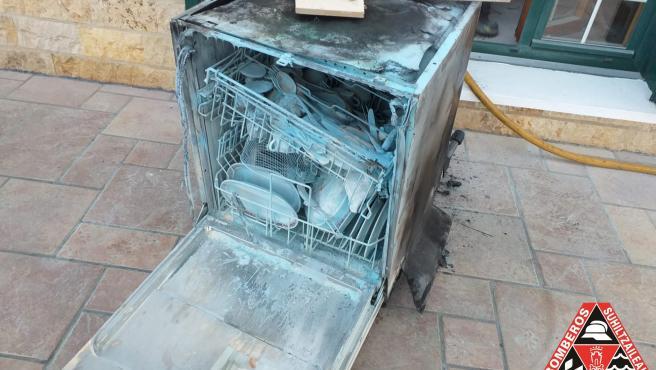Do you plan to leave the washing machine or dishwasher on at night to save electricity? Beware of 'sweet death'
Eight years ago, at an open house at the Pozuelo Fire Station, an officer made a recommendation to children who visited the facilities: "Ask your parents never to leave the dishwasher on at night."
Next, he recounted the incident that the firefighters had attended years before. They entered a house full of smoke, and found a gruesome painting: all the members of a family dead in their beds. They had left the dishwasher running overnight, which burned down and although the flames did not consume the house, its occupants died of carbon monoxide poisoning: the so-called sweet death.
Only in April there have been at least two fires caused by burning the dishwasher: one in Vitoria and another in Segorbe (Castellón). Now that many people have the idea of leaving appliances running at night to save light, fire experts are once again calling attention to the dangers of this practice.
The nocturnal temptation
And the fact is that the new electricity tariff distinguishes three time slots, the cheapest of which is from midnight to eight in the morning between Monday and Friday and all day on weekend. Situation that has caused countless jokes about ironing at dawn or cooking late at night.
But many people may be tempted to go to sleep with the washing machine or dishwasher (two of the appliances that use the most electricity) running, since they turn off by themselves at the end of the cycle, or leave mobile phones or electric scooters charging. Practices that carry certain dangers, according to Roberto Alonso, an officer of the Madrid City Council Fire Brigade.
"The greatest risk we have when using electrical appliances at night is that there is no longer a face-to-face control," says Alonso. "If there is a bug or problem, it will take longer for the user to discover that bug."

"If it's just that it stops washing, there's no problem, but if there's a short circuit and the problem worsens, it will take longer for the user to realize it," he adds. "If there's a problem with the dishwasher and it starts to catch fire, the user is sleeping, because they're not going to stay up at night to see it, and it's going to take until they realize that that appliance is on fire. And response time is important for the firefighters.
The danger of the night
The fire officer points out that these types of incidents are especially worrisome in the night strip.
"For the Fire Department, the type of accident that worries us the most is night fires, because there is no face-to-face control: everyone is sleeping and people take longer to realize it," says Alonso.
"A very big problem is that the house begins to fill with smoke, due to a short circuit or a bypass in the use of electrical appliances, whether they are dishwashers, washing machines, or now that they are beginning to leave electric scooters charging inside homes, or even their own cell phones," he adds. "If no one in the family notices, the house fills with smoke and in the end you can die simply from that smoke that the short circuit or shunt has generated."
Each year, the Mapfre Foundation and the Professional Association of Firefighters prepare a study on fire victims. The most recent, with data from 2019 (you can consult it later), quantifies 165 deaths; 91 of them (55%) occurred at night, and the vast majority of cases (99 deaths, 66%) died from poisoning.
The vast majority of fire deaths occurred in homes (125, 76%). In most of these cases (41%), the probable cause of the fire was electrical.
Study: victims of fires in 2019. Fundación Mapfre and APTBde 20minutosAntonio Tortosa, vice president of Tecnifuego (Spanish Association of Fire Protection) confirms that it is a pattern that is repeated every year. "Obviously it is when more people are in the houses, and dinner is being prepared, washing machines are installed, and it is where there are more fires," he comments. "If we also now load the network with everything that is being talked about connecting equipment, then the number of fires can rise."
Antonio Tortosa
Tortosa points out that, "with or without a rise in electricity", care must be taken to ensure that the electrical installations are in such conditions that they are adequate for the overload of the household appliances that are used.
"If we have, for example, electrical installations from 40 years ago and with a certain type of wiring and the electrical consumption used by household appliances today is going to be higher than that installation, then we can have overload problems, short circuits and possible fires," he explains.
Although new urban developments already have more modern facilities, there are still many older homes in which these facilities have not been updated, due to lack of money or foresight. "It is logical and normal that the average citizen does not have knowledge of these concepts," he adds.
More fires caused by scooters
The Madrid Fire Department officer also confirms that there are more fires caused by electric scooters, either because they have battery problems or because inadequate or unapproved chargers are used for that team.
"The ideal would be to load them outside the homes, but few homes have a terrace or some area where they can be loaded without them being inside," he points out. "The electric scooter has a larger battery than the mobile and the risk it generates is greater."
Fire alarms
Experts point out that, in general, you should always be aware of possible wiring problems, breakdowns in electrical appliances (Alonso asks to leave maintenance in the hands of professionals and not do it yourself) and do not overload the strips. And above all, install a fire alarm.
The fire officer explains that it doesn't have to be a sophisticated installation or connected to a central. There are some small, battery-operated ones that can warn if there is smoke in the kitchen or other area of the house.
But both he and the vice president of Tecnifuego agree that in Spain there is still little culture regarding these devices, which could reduce the number of deaths from home fires by up to 70%.
"Awareness in Spain is very small, practically nothing," estimates Tortosa, who gives as an example countries like the United Kingdom, which has had a regulation in this regard since the 1970s, and France, where fire alarms have been mandatory since March 2015.
"And ideally these detectors should be connected to a central, because we have a 24-hour service, 365 days a year, and people with reduced mobility or physical problems would have less chance of death, because the central receiving the alarm would notify the fire brigade directly".









4036